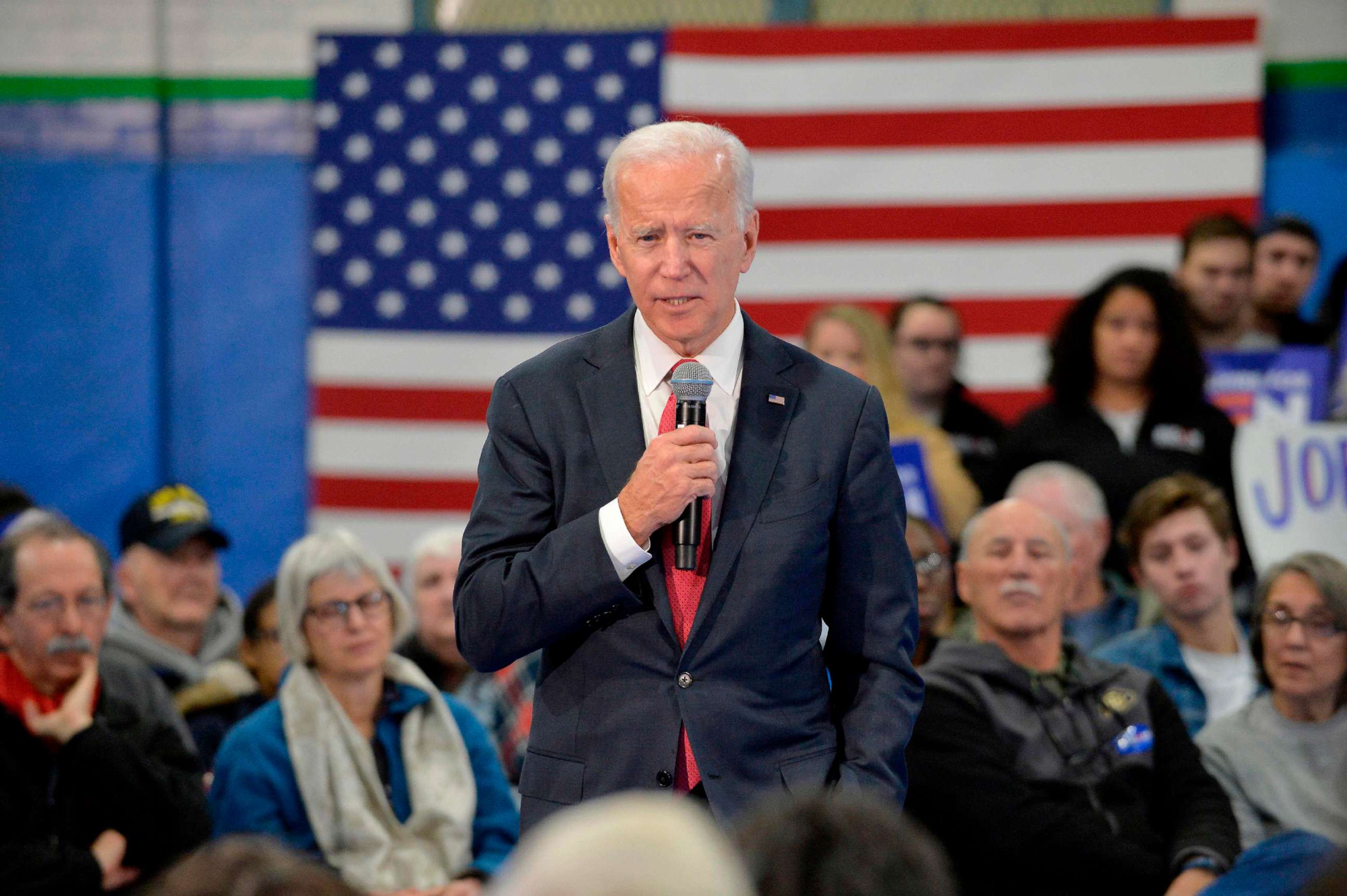Biden releases plan to address violence against women 25 years after original bill
The plan comes 25 years after the original violence against women legislation.
Former Vice President Joe Biden is releasing his proposal to update one of his signature pieces of legislation: The Violence Against Women Act.
The Biden Plan to End Violence Against Women, builds upon the legislation Biden spearheaded 25 years ago as a senator and seeks to address the issues of sexual, domestic and gender violence in several ways -- including financial help for survivors, as well as addressing cultural attitudes on the subject.
His plan also puts an emphasis on addressing issues specific to survivors from different communities, backgrounds, ages and ability, and changing the culture on sexual assault, including a focus on protections for transgender women of color following an "epidemic" of homicides directly targeting the group.
"It is heartening to see Presidential candidates focusing on this epidemic of violence. Vice President Biden's plan promises not only a response to violence and support for victims after the fact, but also tries to get at the roots causes of this violence: stigmatization, marginalization, and criminalization. Trans women of color deserve to be treated well, given a fair a chance, and protected from violence," Mara Keisling, the executive director the National Center for Transgender Equality, a policy group that has advised several campaigns on transgender policy, told ABC News in a statement.
Several Democratic 2020 candidates have also sought to bring attention to the issue of violence against the transgender community of color, including Sen. Elizabeth Warren, D-Mass., Sen. Cory Booker, D-N.J. and South Bend, Indiana, Mayor Pete Buttigieg.
According to Biden's proposal, he also pushes an expanded "safety net" for survivors of domestic, sexual or gender violence, offering financial assistance for housing by creating a comprehensive housing grant program specific to those survivors. Biden also promises to allocate $5 billion to community organizations to provide cash grants to survivors in need, as well as federally mandated paid leave for those impacted by violence.
The former vice president is also pledging to end the rape kit backlog as a part of his proposal, increasing funding for this effort from the current level of $42 million to $100 million a year.

"This is a significant increase to that and that is to replicate some of the successful projects we've seen at the local level in moving through these rape kits, and it's particularly focused on law enforcement approaches to these crimes and moving through the backlog that's actually in police storage," one senior adviser said on a call with reporters on Sunday.
He is not the first 2020 candidate to propose ending the rape kit backlog, in July, Sen. Kamala Harris, D-Calif., proposed investing $1 billion.
Biden anticipates addressing a new challenge with his plan by focusing on online violence and harassment. The former vice president will convene a national task force on online harassment and abuse that will "consider platform accountability transparent reporting requirements for incidents of harassment and response, best practices, and more," his campaign advisers said.
Advisers to Biden did not give a specific price tag for the whole plan, arguing that much of what is laid out could be done without additional federal money, focusing instead on "changing regulations, issuing guidance and changing the culture."
As a part of his rollout, Biden launched a new television and digital ad in Iowa highlighting this new proposal, featuring a supporter at one of his rallies tearfully sharing how Biden helped her -- as a survivor of domestic abuse -- through his work on the original legislation.
Biden often touts the Violence Against Women Act as one of his "proudest" accomplishments. On the trail, he has been critical of Senate Majority Leader Mitch McConnell for not allowing the 2019 Violence against Women Act reauthorization for a vote on the Senate floor.
The Biden campaign pledged that as president Biden would prioritize reauthorizing the act in the first 100 days of his administration.
In his policy release, the campaign noted the #MeToo movement had "forced a national reckoning on the depth and breadth of sexual harassment and violence in our workplaces, our campuses, and our communities."
Prior to officially entering the 2020 race, Biden faced controversy after several women accused him of making them uncomfortable with what they considered inappropriate touching. He posted a video acknowledging that "social norms are changing" and promised that he would be "much more mindful," calling it his "responsibility." He was criticized for the response amid questions that it was insufficient.
Following Biden's policy rollout, Rape, Abuse, and Incest National Network (RAINN), the nation's largest anti-sexual violence organization said they were "encouraged" to see candidates addressing the issue.
"We are encouraged that 2020 candidates are talking about how to prevent and respond to sexual violence. Supporting survivors, ending the rape kit backlog, and educating the public are among RAINN's top priorities, and we look forward to continuing to work with our elected leaders to combat sexual violence," Erinn Robinson, RAINN's press secretary told ABC News in a statement.
ABC News' John Verhovek contributed to this report




